One of the most potent acts of self-sabotage is the misguided habit of putting oneself down, that is, self-criticism.
Though it may seem like a safe, fake-humble and even served up as funny behaviour, in reality, it effectively breaks down and maintains low self-esteem, self-worth, and self-respect, while also exposing vulnerability and low resilience.
Life is tough, why make it even harder for yourself?

Fear of failure
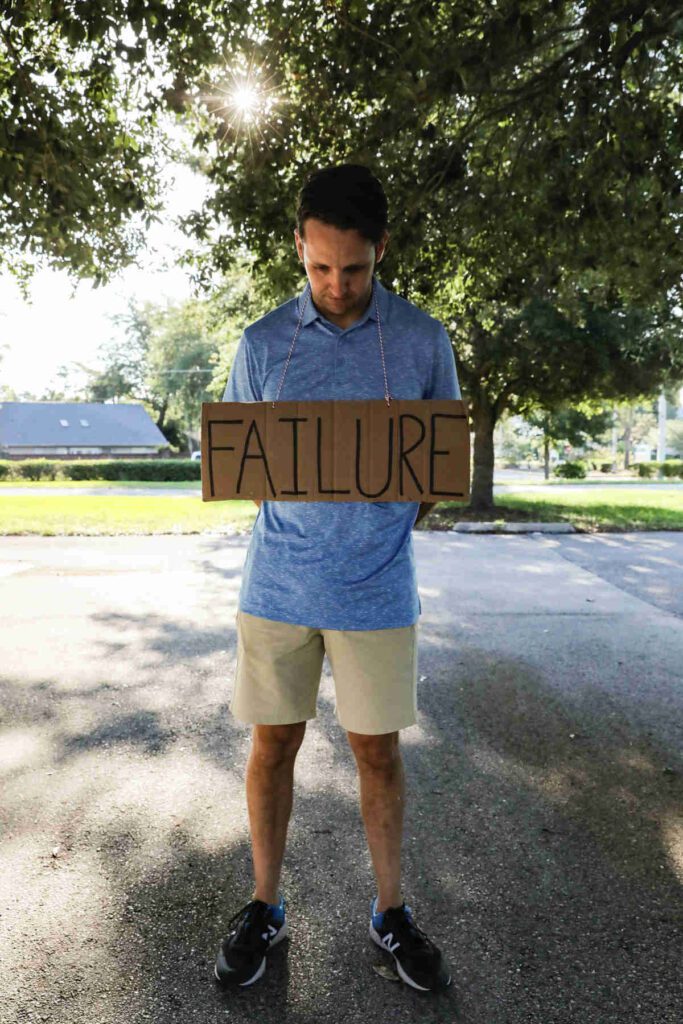
People with low confidence may put themselves down as a way to protect themselves from the anticipated pain of failure. By setting low expectations, you feel less pressure to succeed and can avoid disappointment, embarrassment or rejection if things don’t go as planned.
Fear of failure is a powerful force that can drive individuals to engage in self-critical and judgemental behaviours, including putting themselves down.
Example: You might be unsure about taking on a challenging project at work due to a fear of not being able to meet expectations. In response, you may pre-emptively put yourself down by saying things like, “I’m not smart enough for this project” or “I always mess things up.” You use this as a way to limit others expectations or even to avoid being asked to do this at all.
By identifying and acknowledging the underlying cause for this self-defeating habit, you can begin to develop healthier thought patterns and more effective ways to manage it, ultimately boosting your confidence.
You must recognize that fear of failure is a natural human emotion. Also, whether you believe it or not, everyone, yes everyone, experiences setbacks and disappointments in all areas of life.
By looking at failure differently, as an opportunity for growth and learning, and a stepping stone towards success, you can shift your mindset to view challenges more positively.
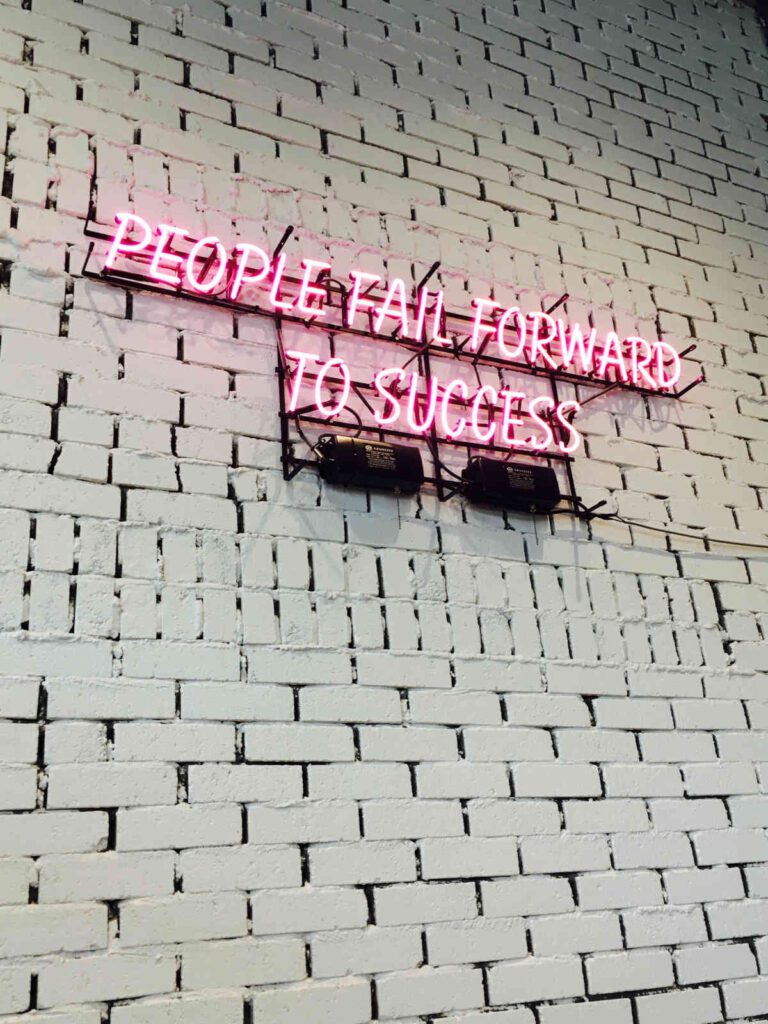
If a road you take does not get you to a desired destination, you don’t stop travelling do you? You have found one route that does not go where you want. So you change direction to find another route on your way to your destination. But while travelling on that first route you figured how to manage the satnav, and realised that you really need to learn how to read a map and compass better. So the initial attempt that, on paper, could be put in the column of failure as it did not turn out the way you hoped, helped you learn something new as well as highlighting skills that you could develop to take on many other journeys in the future.
Embrace the idea that no one is perfect. And every experience – whether successful or not – provides valuable information that can help personal and professional development. By doing so, you’ll be less inclined to put yourself down. Instead, approach challenges with greater self-assurance and resilience, ready to grow from any outcome.
Seeking validation BY BEING SELF-CRITICAL
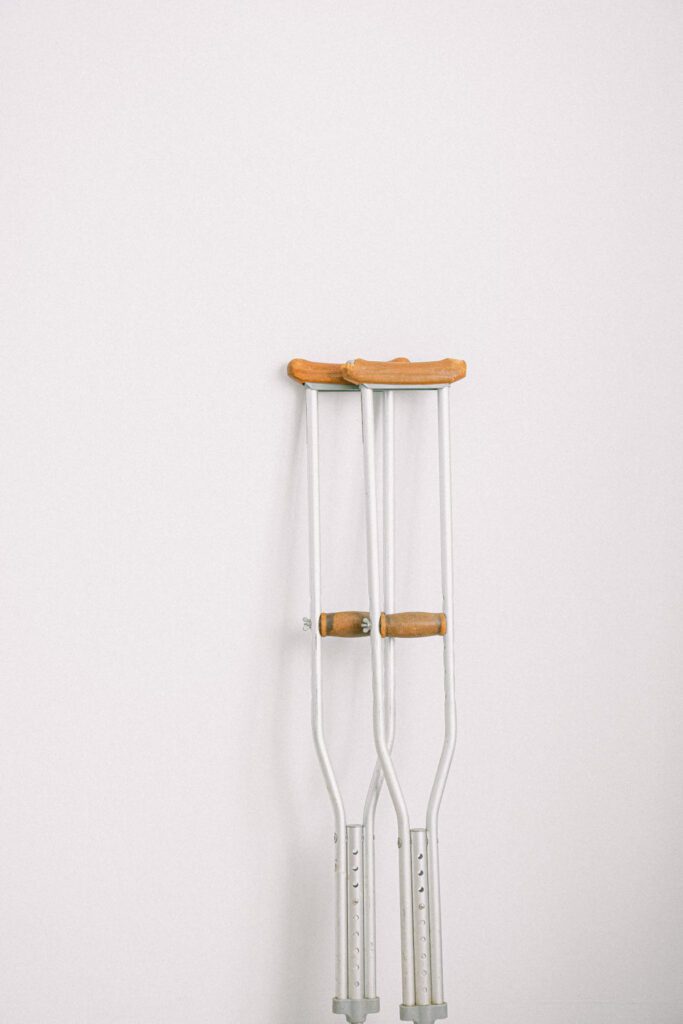
If you lack self-confidence you might habitually put yourself down in the hope that others will step in to reassure you, offer compliments, or validate your worth. You rely on them to prop you up with evidence that you are worthwhile or capable.
Example: A person criticizes their appearance or skills in front of friends. They do this hoping that their friends will counter this negative self-assessment with praise and affirmation. Saying, “I look so fat today” while holding out for someone to say “No, you don’t, you always look great”.
These external ego boosts can temporarily boost your self-esteem. But ultimately it will only reinforce your reliance on others for approval and worth.
To overcome this unhelpful habit, it’s crucial to identify and acknowledge your underlying need for approval. And shift the focus from an external source towards cultivating self-validation and self-love. Begin by recognizing your inherent worth and embracing your unique qualities, talents, and accomplishments. Practice positive self-affirmations and treat yourself with kindness and compassion, just as you would a dear friend. Start giving yourself regular ego boosts, celebrating who you are and the value you bring.

By fostering a stronger sense of self-worth independent of others’ opinions, you can gradually reduce the need for external validation and become more self-reliant in maintaining your confidence yourself. As you learn to appreciate and love yourself for who you are, you’ll find less reason to put yourself down. Instead, stand tall in the knowledge that your value comes from within. As a bonus, you may become more resilient and less affected by others’ views as they will not stack up against the truth that you know about yourself.
Fear of criticism or rejection
By putting yourself down first, you may believe that you can get ahead of any potential criticism or rejection from others. This self-deprecation can act as a shield, deflecting negative comments before they have a chance to hurt you.

Example: Someone might criticize their presentation skills before giving a speech. They think that this will lower others’ expectations of them and prevent them from pointing out any flaws. “I’m not really good at talking like this”; “I don’t know much about using PowerPoint”; etc
While this behaviour might offer temporary protection from external judgment, it ultimately undermines self-confidence and maintains a cycle of negativity.
To address this behaviour, it’s essential to recognise and acknowledge your underlying fear of criticism or rejection. Pin-pointing the cause can then lead to developing healthier ways to cope with these concerns.
Start by recognizing that no one is immune to criticism, and it’s impossible to please everyone all the time. Instead of focusing on the opinions of others, concentrate on your personal growth and self-improvement. Stand sure in the truth that you know about yourself and your abilities. Embrace constructive feedback as an opportunity to learn and develop new skills. While also understanding that not all criticism is valid or worth making part of your internal world.

By shifting your mindset and building resilience in the face of criticism or rejection, you can reduce the need to put yourself down as a defence mechanism. As your confidence grows, you’ll be better equipped to handle challenges that come your way. You will know that your self-worth is not determined solely by, or reliant upon, the opinions of others.
Perfectionism MASKING SELF-CRITICISM
There are people with low self-confidence who hold themselves to unrealistically high standards. They believe they must be perfect in everything they do in order to be worthwhile. When they inevitably fall short of these expectations, they may harshly put themselves down as a way of punishment. Reluctantly acknowledging their perceived inadequacies that they have been working hard to hide from
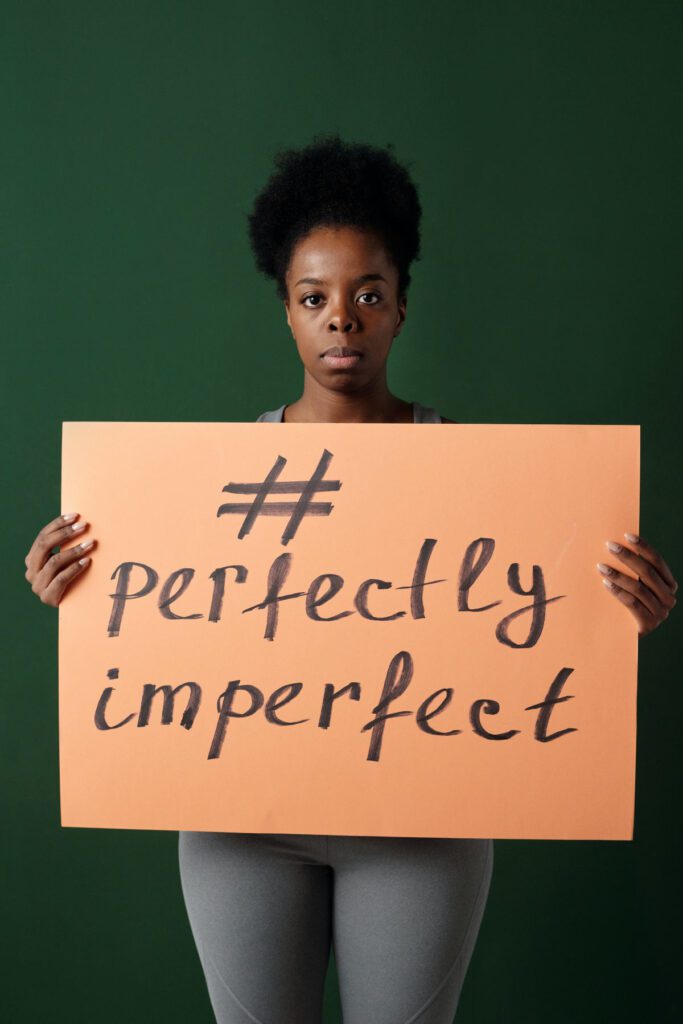
Example: A perfectionist might receive a 95% score on an exam and focus solely on the 5% they missed. And keep criticising themselves for not achieving a perfect score. This self-critical behaviour only serves to undermine their confidence and perpetuate a cycle of negativity. It also appears fake and extreme.
To address such perfectionism begin by embracing these facts: nobody is perfect; it’s normal to make mistakes, experience setbacks, and have areas for improvement; this is how we all learn and grow.
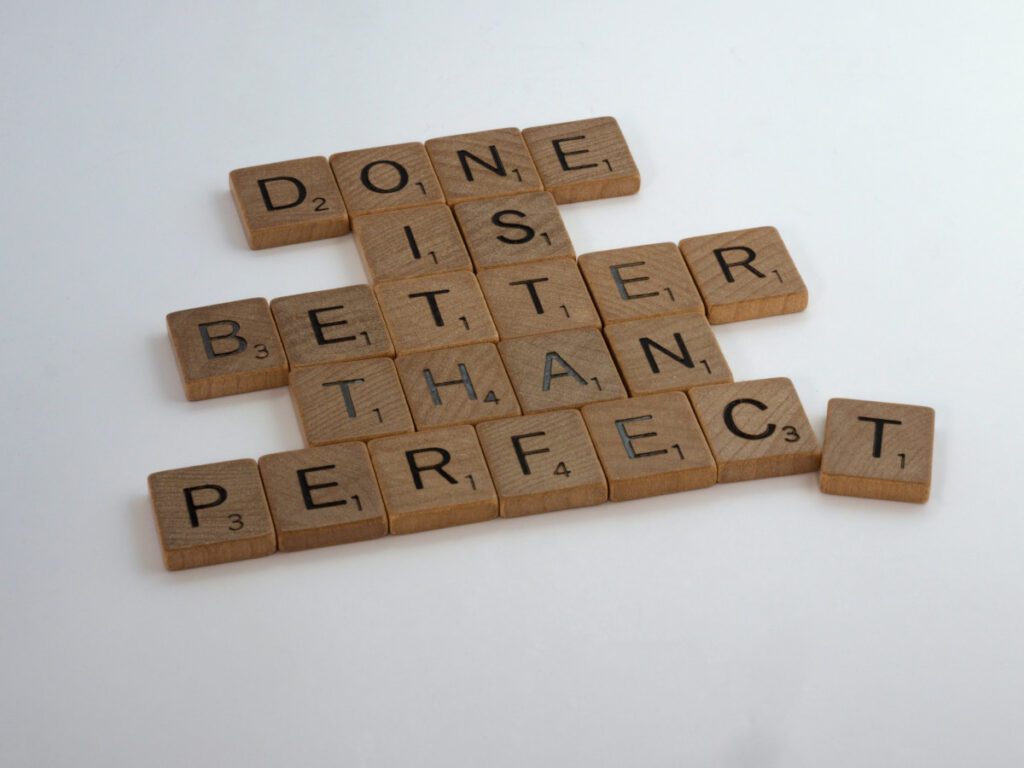
Instead of striving for perfection, shift your focus towards progress and growth. Set achievable goals that challenge you while still being realistic. Challenge yourself to fail at something simple and get familiar with how it feels. Finding out about how this can help you learn. And help you accumulate evidence that it is, in fact, not be the end of the world as you know it. Give yourself a break! Discover that there are more options to explore and enjoyment to be had when you are not beating yourself to be perfect or to win every time.
By adopting a more balanced perspective on achievement, you can learn to appreciate your successes and view things you may not be good at as opportunities for growth rather than reasons to put yourself down. As you cultivate this mindset, your confidence will grow. And you’ll be better equipped to navigate the ups and downs of life with greater resilience and self-compassion.
Social comparison MAINTAINS SELF-CRITICISM

Constantly comparing oneself to others leads to feelings of inferiority and low self-confidence. As a result, people may criticise themselves to emphasize the contrast between their perceived shortcomings and the abilities, achievements and personal characteristics of those around them.
This behaviour successfully cultivates a negative self-view. This is because people most often focus on the areas in which they think themselves to be lacking or inferior. And believe the bright shiny areas of others lives that they can see, without realising the distortion of these perspectives.
Example: You may compare your career progress to that of a highly successful friend. You feel discouraged and inadequate when you realize you haven’t achieved the same level of success and/or status. This constant comparison is expressed by your putting yourself down, beating yourself up in words and thoughts.

When the truth is that everyone has their own unique journey, with strengths, and weaknesses. Realising that can shift your focus from comparisons to appreciating your accomplishments and qualities. It is this that then fosters a healthier self-image and boosts your confidence.
As you develop more self-compassion and embrace your individuality, you can become less prone to the epidemic that is unhelpful social comparisons, and walk tall with greater self-assurance.
Habitual negative thinking
Sometimes self-criticism becomes an ingrained habit that you’ve mastered over time. You may not even realize you’re doing it. But this it underpins and maintains your low self-confidence and perpetuates a cycle of negativity.

Habitual negative thinking is a repetitive pattern of focusing on the unfavourable, not-so-nice aspects of life. This self-defeating mindset often magnifies your personal flaws and perceived failures while minimizing or ignoring your successes and positive qualities.
Example: You receive praise for a job well done. And you dismiss the compliment, focusing instead on the minor mistakes that you made along the way. “Oh its nothing really. And I did not remember to add in the part about last weeks meeting…”
By becoming aware of this way of thinking, you can challenge and re-arrange your thoughts, replacing them with more balanced and realistic perspectives.
One powerful technique involves practicing mindfulness, which helps you to look at your thoughts and behaviors without judging them. This helps you to develop a more compassionate inner conversation. As you develop this skill, you can gradually shift from self-criticism to self-acceptance. Then you can build a healthier self-image and boost your confidence. Over time, breaking free from the grip of negative thinking can allow you to recognize, enjoy and celebrate your strengths. This paves the way for personal growth and increased self-assurance.
Now you know more about how the misguided act of self-criticism serves to further erode your self-esteem and keeps the cycle of negativity going. Identifying the underlying causes for this undermining habit can be your first step toward breaking free from its grip and boosting your confidence.

Instead of focusing on your perceived shortcomings, make a conscious effort to create a list of your personal qualities, talents, and achievements. Take the time to think about them, adding in evidence that confirms them to you. Truly appreciate them. Then when you are next tempted to criticize yourself, take a breath to pause and remember this list. It will help you to more easily remind yourself of your strengths and abilities.
Stand taller, smile, and embrace the knowledge that you are worth so much more than the negativity you’ve been feeding yourself. By shifting your mindset, you can cultivate a stronger sense of self-worth, resilience, and confidence that will empower you to thrive in all aspects of life.